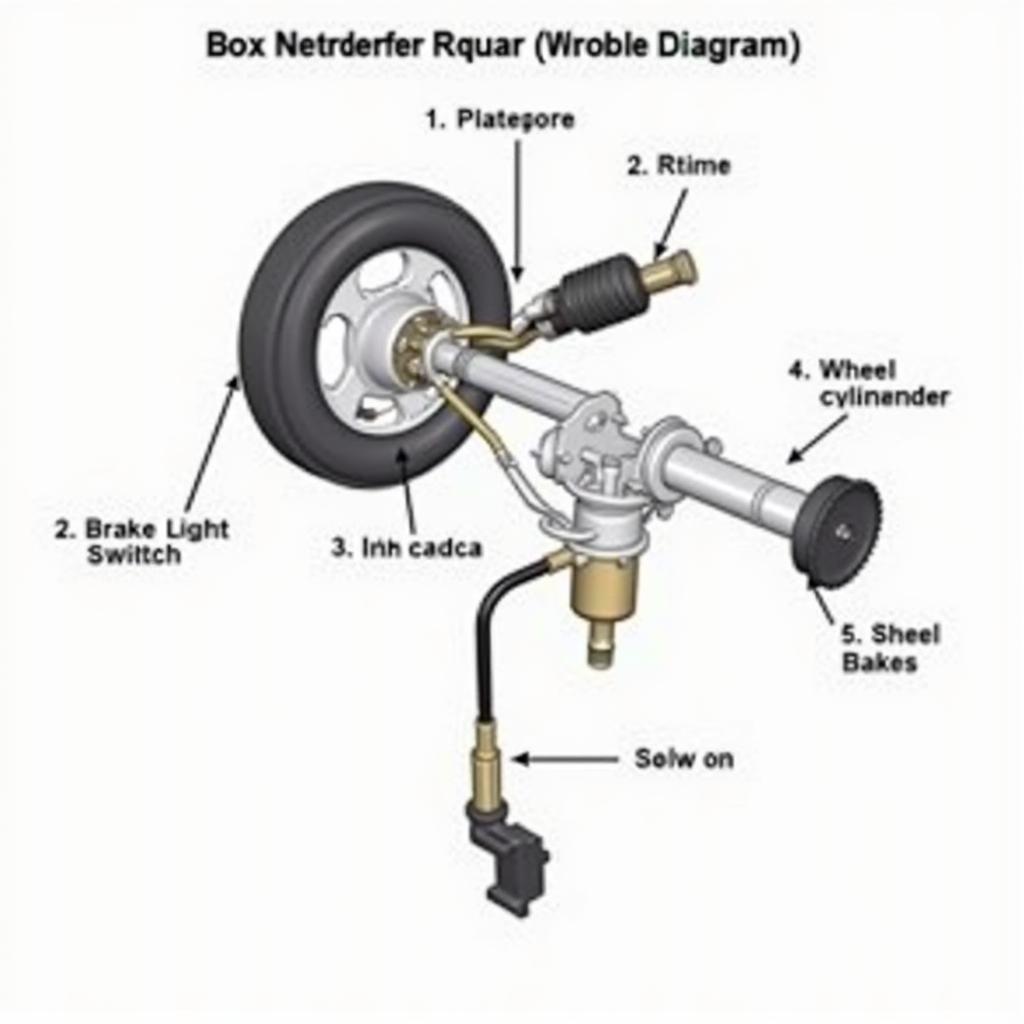A glowing brake warning light on your Mercedes dashboard can be a cause for concern. While it might just be a minor glitch, it could also signal a serious issue with your braking system. This guide will cover the common reasons behind a constantly illuminated brake warning light in Mercedes vehicles and provide you with potential solutions to address the issue.
Understanding Your Mercedes Brake Warning Light
Your Mercedes, like most modern vehicles, is equipped with a sophisticated sensor system that monitors various components. When the brake warning light illuminates, it signifies that one or more of these systems have detected an anomaly.
Common reasons for the brake warning light to stay on in a Mercedes include:
- Worn Brake Pads: This is the most frequent culprit. Mercedes vehicles are equipped with brake pad wear sensors. When the brake pads wear down to a certain level, the sensor triggers the warning light, signaling a need for replacement.
- Low Brake Fluid Level: Brake fluid is the lifeblood of your car’s braking system. A leak or low fluid level can significantly compromise braking performance and trigger the warning light.
- Faulty Brake Light Switch: A malfunctioning brake light switch can disrupt the circuit, leading to the brake lights and warning light remaining on even when the brake pedal is not engaged.
- ABS Sensor Issues: The Anti-lock Braking System (ABS) prevents wheel lockup during hard braking. A malfunctioning ABS sensor can trigger the brake warning light.
- Problem with the Electronic Stability Program (ESP): The ESP works in conjunction with the ABS to maintain vehicle stability. Issues within the ESP system can also lead to the illumination of the brake warning light.
- Electrical Fault: Sometimes, a short circuit or a wiring issue within the brake light system can be the root cause.
Troubleshooting a Mercedes Brake Warning Light
Before you panic, here’s a step-by-step guide to troubleshoot the brake warning light on your Mercedes:
- Check Your Brake Fluid: Park your car on a level surface and visually inspect the brake fluid reservoir. If the fluid level is below the minimum mark, it needs to be topped up. However, if you notice a significant drop in fluid level, it indicates a leak that needs immediate professional attention.
- Inspect Brake Pads: If your brake fluid level is adequate, the next step is to check the thickness of your brake pads. Look through the spaces between the wheel spokes to get a visual of the brake pads. If they appear thin or you hear a grinding noise when applying brakes, it’s time for a replacement.
- Test the Brake Light Switch: Locate the brake light switch, usually positioned above the brake pedal. With the ignition off, press and release the brake pedal several times while observing if the brake lights illuminate accordingly. If the lights don’t turn on or stay on consistently, the switch might be faulty and needs replacement.
When to Consult a Professional
If you’ve gone through the basic troubleshooting steps and the brake warning light remains illuminated, it’s crucial to seek professional help. Issues related to the ABS, ESP, or electrical faults require specialized diagnostic tools and expertise. Attempting to fix these issues yourself can be dangerous and potentially worsen the problem.
Mercedes Brake Warning Light Reset
In some cases, after addressing the underlying issue, the brake warning light may require a manual reset. This usually involves using a specialized OBD-II scanner to clear the error codes. However, if the problem persists even after resetting, it indicates that the issue has not been fully resolved.
bmw brake warning light red reset
FAQs
Q: Can I still drive my Mercedes with the brake warning light on?
A: While technically possible, driving with an illuminated brake warning light is highly discouraged. It indicates a potential problem with your braking system, which could lead to reduced braking efficiency or even complete brake failure.
Q: How often should I check my brake fluid?
A: It’s good practice to visually inspect your brake fluid level at least once a month and top it up if necessary.
Q: How much does it cost to replace brake pads on a Mercedes?
A: The cost can vary depending on the model and whether you opt for genuine Mercedes parts or aftermarket options. On average, expect to pay between $150 to $300 per axle.
Q: Can a faulty brake light bulb trigger the brake warning light?
A: While a faulty bulb won’t directly trigger the warning light, it’s a good idea to ensure all your brake lights are functioning correctly for overall safety.
Q: How long can I drive with worn brake pads?
A: Driving with worn brake pads is extremely risky. Once the brake warning light illuminates, it’s crucial to get them replaced as soon as possible.
Conclusion
Ignoring a persistent brake warning light on your Mercedes can lead to serious consequences. By understanding the common causes and following the troubleshooting steps outlined, you can take the right course of action to ensure your safety and the well-being of your vehicle. If you’re ever in doubt, always consult a qualified Mercedes technician for a thorough diagnosis and repair.

